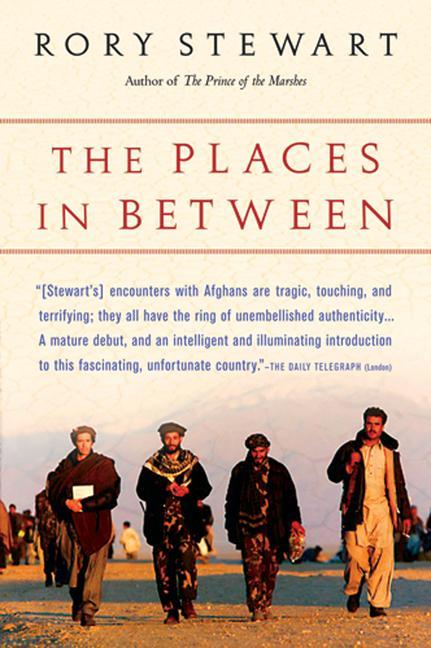Places In Between by Rory Stewart

In this New York Times Bestseller, Rory Stewart takes readers on a gripping 36-day journey across Afghanistan, shortly after the fall of the Taliban. Described as “stupendous” and an “instant travel classic” by Entertainment Weekly, this account is a must-read for adventure enthusiasts and those interested in understanding the complexities of Afghanistan.
The journey begins in January 2002, as Stewart embarks on a perilous walk across the snow-covered mountains of Afghanistan. Armed with his linguistic skills and deep knowledge of Persian dialects and Muslim customs, he navigates through hamlets devastated by the Taliban and witnesses the resilience of communities thriving amidst the remnants of ancient civilizations.
Despite the challenging terrain and political turmoil, Stewart relies on the kindness and hospitality of strangers. Sleeping on villagers’ floors and sharing meals with them, he learns their stories of the recent and ancient past. Throughout the journey, Stewart encounters a wide array of individuals, ranging from heroic figures to dubious characters. He engages with tribal elders, teenage soldiers, Taliban commanders, and foreign aid workers, gaining unique insights into the diverse perspectives and experiences of the people he meets.
One unexpected bond is formed with a retired fighting mastiff that Stewart names Babur, paying tribute to Afghanistan’s legendary first Mughal emperor. This loyal companion accompanies him faithfully, echoing the footsteps of Babur.
Through these encounters, Stewart vividly captures the forces of tradition, ideology, and loyalty that shape the lives of people inhabiting the lesser-known corners of the world map. The tales he shares are heartwarming, perplexing, surprising, and humorous, offering a tangible glimpse into the ever-evolving Afghan society.
Unraveling the Chaos: Lessons from Afghanistan and Iraq
This article is presented by University of California Television. If you like what you learn, visit our website or follow us on Facebook and Twitter to keep up with the latest UC TV programs.
Welcome to a Conversation with History
I’m Harry Kreisler of the Institute of International Studies. Our guest today is Rory Stewart, a member of the British Parliament from Penrith and the Border. He’s the author of numerous books and has had diverse experiences including walking across Asia and serving as the deputy governor of two provinces in Iraq. In this interview, Rory discusses his upbringing, his experiences in different countries, the challenges of intervention and the power of bureaucracy.
Early Experiences
Rory was born in Hong Kong and was raised in places like Malaysia and London. His father was a civil servant and his mother was an academic. Rory credits his father’s rebellious nature and motto of “getting on with it” as influences on his own thinking. Rory also spent a lot of his childhood in different countries due to his father’s military service during World War II.
Education and Military Service
Rory was educated in London and Malaysia before attending Eton and joining the British Army. He initially loved history but switched to studying philosophy. Rory served in the Black Watch regiment and experienced a lack of action and bureaucracy in the army. He later joined the Diplomatic Service and was posted to Indonesia, where he witnessed the collapse of the economy and the end of Suharto’s rule.
Walking Across Asia
Rory embarked on a journey to walk across Asia, starting in Turkey and passing through countries like Iran, Afghanistan, Pakistan, India, and Nepal. He wanted to experience the world by putting one foot in front of the other and connecting with rural areas and village communities. Rory gained valuable insights into different societies and saw how people’s lives were shaped by history, culture, and their relationships with each other.
Intervention in Afghanistan and Iraq
After the overthrow of the Taliban, Rory had the opportunity to walk across Afghanistan for a month and a half. He observed the complexities and resilience of traditional social structures in the face of foreign intervention. Rory later served as the deputy governor of two provinces in Iraq, where he confronted the challenges of trying to implement Western ideals of democracy and development in a complex and chaotic environment.
The Clash of Modernity
Rory highlights the clash between Western notions of modernity and the traditional realities of countries like Afghanistan and Iraq. He criticizes the abstract theories and flimsy justifications often used to justify intervention, as well as the inability of bureaucratic structures to adapt to the complexities on the ground. Rory emphasizes the importance of understanding history, culture, and the desires of local populations in order to have a more nuanced and effective approach to intervention.
The Role of Politicians
Rory believes that politicians have a crucial role in bridging the gap between people and government bureaucracies. He emphasizes the need for politicians to be objective and detached from the bureaucratic mindset in order to challenge and question policies. Rory also encourages politicians to have a deep understanding of the complexities of the societies they are dealing with and to constantly question their own assumptions and beliefs.
Conclusion
Rory expresses his optimism about people’s abilities and his skepticism towards government structures and ideas. He believes that politicians can act as lenses between people and government, facilitating communication and challenging both sides to become better through open and honest conversation. Rory also encourages students to go abroad and experience different cultures in order to broaden their perspectives and challenge their own assumptions.







Leave a Reply